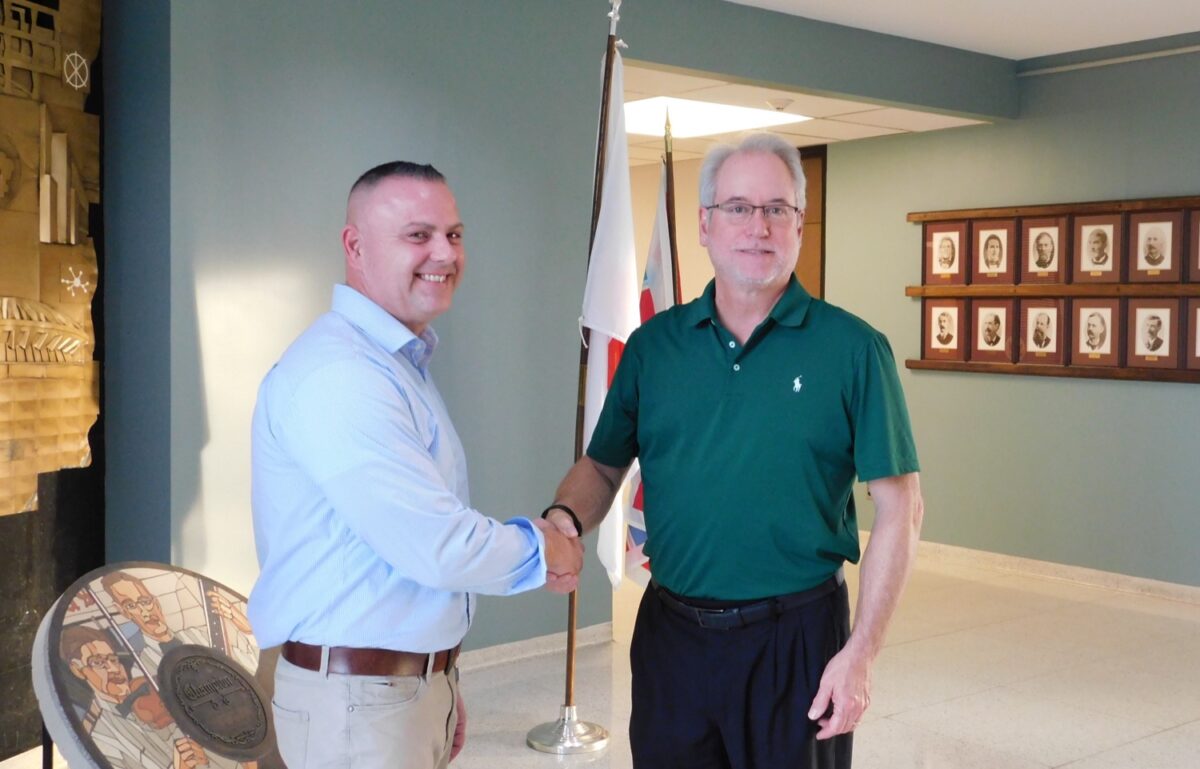Ending a long tradition of appointing a new police chief from within Richmond Police Department, Mayor-elect Ron Oler has named a 22-year employee of Wayne County Sheriff’s Office as RPD’s next leader.
Oler announced Thursday, Nov. 16, that Kyle Weatherly will be the city’s police chief as of Jan. 2.
Before the media event, current Chief Mike Britt and RPD employees were notified of the decision to name a new chief from outside the department.

After three years as chief, Oler said Britt is happy to remain with RPD as a lieutenant until his retirement and continue to serve, “and that’s important.”
Although he and Weatherly had become acquaintances in previous years “in a good way,” Oler emphasized, the mayoral candidate came to know Weatherly better in the past year.
Weatherly is married to Anne Taylor, who campaigned with Oler and other fellow Republicans throughout 2023 for roles in city government. On Nov. 7, Taylor was elected to her first term on Richmond Common Council. She defeated incumbent Jeff Locke to represent District 5 on the city’s north side.
Oler said he went outside RPD because he found “an excellent candidate with excellent skills and a servant leader’s heart.”
Oler said council members sign conflict-of-interest statements, and Taylor would abstain from votes on the police salary ordinance or other matters directly affecting Weatherly.
“He’s definitely the best person we could have as chief,” Oler said.
Oler said he interviewed current RPD employees for the chief’s role and considered “a lot” of them to lead the department. He was aware of previous requirements to hire from within the department, but said that statutes had recently changed to allow for an outside hire.
Weatherly currently supervises WCSO detectives. His entire career has been with the local sheriff’s office. Weatherly said he’s excited about this new challenge.
Throughout his campaign, Oler said he would emphasize community policing if elected. He now believes he’s found the best candidate to implement that philosophy.
U.S. Department of Justice defines community policing as “a philosophy that promotes organizational strategies that support the systematic use of partnerships and problem-solving techniques to proactively address the immediate conditions that give rise to public safety issues such as crime, social disorder and fear of crime.”
During Thursday’s announcement, Oler said RPD had tried some aspects of community policing about 20 years earlier, but didn’t follow through.
RPD “will be devoted to transformative leadership both within our own walls as we push and develop our great officers and also this community through community-oriented policing strategies,” Weatherly said. “Honor, integrity and connection will be the pillars of this department going forward.”
Weatherly said to protect the community, RPD must have appropriate resources. RPD’s 2024 budget is expected to be $9.5 million, about 40% of the city’s general fund.
Recruiting and retention strategies are to be implemented to retain officers and attract high-quality candidates, he said.
Weatherly announced his selection of a former WCSO colleague, Sgt. Adam Blanton, to be one of two assistant chiefs. The second veteran officer is to be named later. Blanton works as a fraud/security officer at First Bank Richmond and is one of three U.S. Department of Homeland Security Master Trainers in Indiana and a veteran FBI task force officer assigned to the Behavioral Analysis Unit. Weatherly noted Blanton’s decade-plus of service to the county at WCSO and Hagerstown Police Department.
Oler did not provide a timetable for announcing who will serve as fire chief or other department heads in his new administration.
What are key components of community policing?
U.S. Department of Justice notes three key components:
- Community partnerships: Collaborative partnerships between the law enforcement agency and the individuals and organizations they serve to develop solutions to problems and increase trust in police
- Organizational transformation: The alignment of organizational management, structure, personnel and information systems to support community partnerships and proactive problem solving
- Problem solving: The process of engaging in the proactive and systematic examination of identified problems to develop and evaluate effective responses.
DOJ notes the benefits of a problem-solving model called SARA, which stands for Scanning (identifying and prioritizing problems; Analysis (researching what is known about the problem); Response (developing solutions to bring about lasting reductions in the number of and extent of problems); and Assessment (evaluating the success of the responses).
As part of community policing, some visualize links among the victim, offender and location and factors that could have an impact on them, such as capable guardians for victims (security guards, teachers and neighbors); handlers for offenders (parents, friends and probation officers) and managers for locations (business merchants, park employees and motel clerks).
Instead of focusing primarily on addressing the root causes of a problem, police are encouraged to focus on the factors that are within their reach, such as limiting criminal opportunities and access to victims, increasing guardianship, and associating risk with unwanted behavior.
A version of this article appeared in the November 22 2023 print edition of the Western Wayne News.

